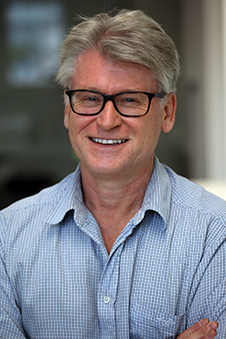As scientists worldwide scramble to quickly develop a drug to prevent COVID-19, a University of Otago scientist has helped create an international guidance statement urging caution in developing treatments.

Dr Daniel Wright.
Senior Lecturer in the University of Otago's School of Pharmacy, Dr Daniel Wright, is a co-author of the statement endorsed by major pharmacology societies around the world.
Currently more than 1,000 clinical trials are underway in the search for a successful treatment for COVID-19 infections.
The international pharmacology societies welcome global efforts to safely expedite clinical trials in the search for a treatment. However, they caution that many studies do not include the information that is needed to safely translate a promising treatment from research to practical use on humans.
Dr Wright says the guidance statement was developed in response to the growing number of drugs being proposed as possible treatment options for COVID-19 but without suitable evidence to support safe and effective use.
“In some cases, particularly for drugs already on the market for other conditions, there has been a rush to translate laboratory evidence of virus killing to human trials,” Dr Wright explains.
“It is not enough to show that a drug can kill the virus in the lab. The drug must also be shown to reach the target tissues and cells – the lung in the case of COVID-19 – in sufficient quantities to kill the virus and at doses that are safe in people.
“The optimal timing of treatment in relation to viral growth and observed symptoms is also important.”
The international guidelines set out 5 principles that are intended to give research efforts the best chance of success to identify potential treatments. These include a call for well-designed trials to show that the drug is safe and effective in the treatment of COVID-19.
President of the British Pharmacological Society Professor Sir Munir Pirmohamed explains the statement sets out principles that will ultimately help develop drugs that can be used for the treatment of COVID-19.
“It is all very well if a treatment works in vitro – but if it cannot reach effective doses in the lung or other target organs, or if it is toxic, it will fail.
“We hope that this advice will help researchers embed clinical pharmacology principles at all stages of research, to help identify the right dose, for the right patient, at the right time.”
For further information, contact:
Dr Dan Wright
School of Pharmacy
Email dan.wright@otago.ac.nz
Liane Topham-Kindley
Senior Communications Adviser
Tel +64 3 479 9065
Mob +64 21 279 9065
Email liane.topham-kindley@otago.ac.nz
Dr Anna Zecharia
Director, Policy & Public Affairs
British Pharmacological Society
Email anna.zecharia@bps.ac.uk
FIND an Otago Expert
Use our Media Expertise Database to find an Otago researcher for media comment.